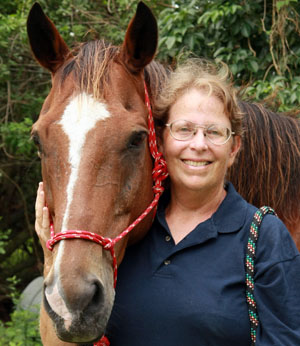TALES FROM THE TRAILS
Merrilyn Griffin is opinionated. Just ask her; she’ll tell you that’s one of the reasons she is a dressage judge. Ah, but there’s a lot more to her than that.
Originally from Ridgewood, N.J., she started riding in high school. Once a week, she would pedal her bike the two miles to a local barn, fork over $2 and ride for an hour in a group lesson. While attending Greenbrier College, she would meander over to the Greenbrier Hotel and ride on Saturdays for $5.
Griffin took a bit of a hiatus from riding for some years after that, working as a registered nurse, marrying a doctor. For their one-year anniversary, her husband gave her a horse. And that, as they say, was that.
“Royal Viking was a 5-year-old Quarter Horse,” she recalled. “He was off the Quarter Horse racetrack, and that was all he knew. We were both relatively inexperienced. Friends told me he would never make it out of first level, but I took him all the way through Intermediare I, as well as preliminary eventing. I got my judge’s credentials with him.”
Griffin moved to Vermont and joined the Judge’s Learner’s Program. The New England Dressage Association hosts the popular USDF “L” (for learner) program for prospective judges, competitors, trainers and anyone else interested in finding out more about evaluating dressage horses and riders. She earned her “L” and later her “r” credentials. By 2003, she and her husband were tired of Vermont’s cold winters, so they moved to Wellington.
“We had just moved here when I received an invitation to judge my first official Florida show up in Canterbury, near Gainesville,” Griffin recalled. “I was incredibly excited. The Friday night before the show, I went out for dinner. Walking back to the hotel, I was mugged. He stole my purse with my wallet, passport, cell phone, everything — slammed me so hard with his arm that he broke my nose.”
But she wasn’t going to let that stop her. “The next day, I sat there in the judge’s booth with a swollen face, broken nose and two black eyes,” Griffin recalled. “Those poor competitors had to ride down centerline looking at a raccoon for a judge!”
That kind of determination is second nature; whatever life throws at you, suck it up and keep doing what you love. Griffin explained that being a rider as well as a judge is a big plus, because it deepens her understanding of riders’ wants and needs.
“When I’m riding, I’m a wreck,” she said. “I’d much rather sit at C than ride down centerline at A. I use a sports psychologist to help me get through it. But understanding the pressure makes me a better judge. I really understand what it’s like when things go wrong.”
Being able to judge a great ride is a wonderful feeling, Griffin said.
“As a judge, I want to give the highest score of the day. This past winter in northern Florida, I was pretty excited to award one rider 80 percent. Every movement was free and clear, and there were prompt transitions.
That was so fun!” she said. “I like to reward good, capable riding of good, capable horses. I love encouraging kids. I’m always looking for the camaraderie, the partnership between horse and rider.”
It is that partnership that Griffin looks for when sitting as judge.
“Good dressage riders are compassionate and able to present their horse to the best of its ability within the horse’s limitations. A good dressage horse should be willing to move forward and respond quickly to aids,” she said. “Something that doesn’t impress me is when a rider tries, and fails, to sit a trot when posting is permitted, at first level and below. All that does is restrict the horse’s movement. I see it so often, and it really bugs me.”
Dressage is all about continual learning, Griffin said.
“In my opinion, the best way for a rider to improve is to continue their education,” she said. “When I’m not riding or judging, I scribe a lot. Observing respected riders at your level is incredibly helpful. Watch them in the warm-up ring and riding the test, and see how they achieve their results.”
Griffin has had some interesting experiences as a judge.
“One rider got so mixed up riding her test that by the time she finished and saluted, the horse’s butt was facing me,” she recalled. “Another time, a kid was riding her test on her pony, and during the free walk, the pony decided to stop and graze, right there in the arena. The kid kicked and pulled on the reins, but the pony just kept on grazing.”
Griffin doesn’t give lessons, careful to maintain her status as an Amateur Adult, but she does offer occasional clinics on how to improve your test riding. She plans to keep on riding and judging, as long as it’s fun. “This past April, I bought a new Intermediare horse, a lovely 17-hand blood bay Dutch Warmblood named Safari ISF,” she said. “I’m excited to see what we’ll do. I prefer judging, but I love it all.”
To contact Griffin, e-mail her at epikaws@aol.com.








